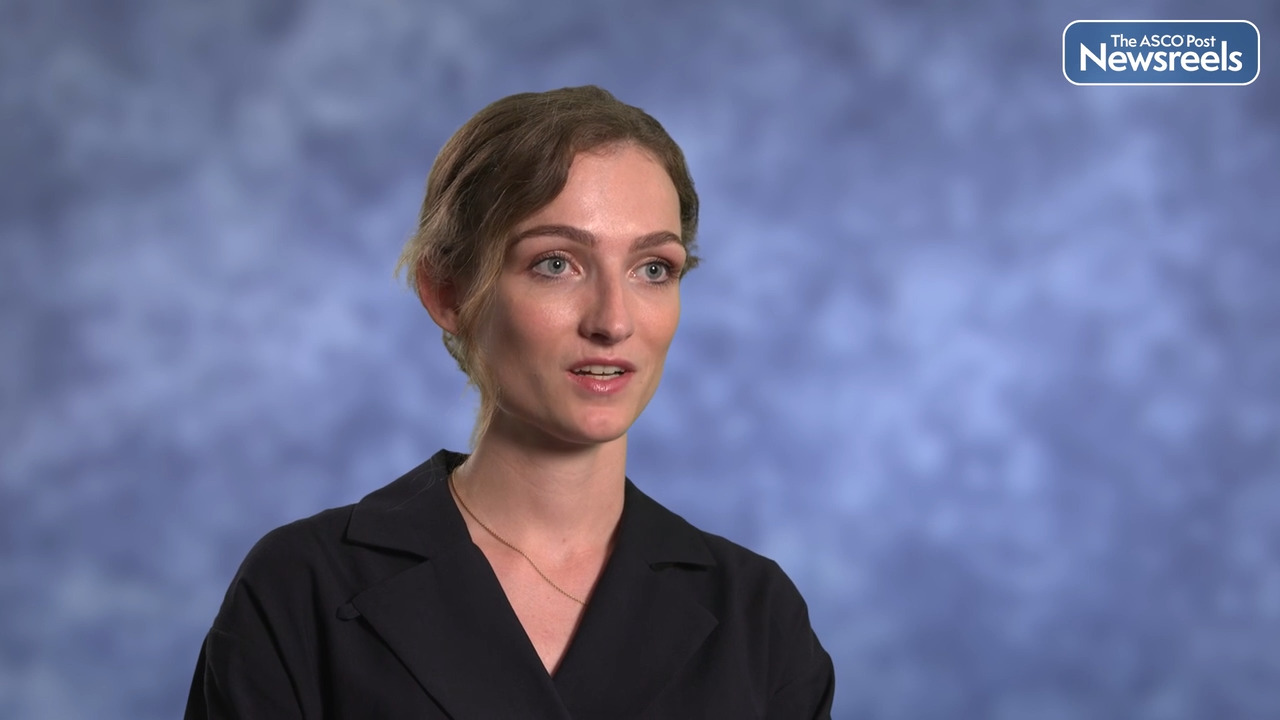FRESCO-2: Fruquintinib for Patients With Refractory Metastatic Colorectal Cancer
Researchers reported study results showing that fruquintinib, a small-molecule tyrosine kinase inhibitor of vascular endothelial growth factor receptors (VEGFR), significantly improved overall survival and progression-free survival in patients with refractory metastatic colorectal cancer. Findings...
Updated Results From the KRYSTAL-1 Study of Adagrasib in Advanced KRAS G12C–Mutated Colorectal Cancer
Updated results from KRYSTAL-1, a multicohort phase I/II study, evaluating adagrasib—an investigational, highly selective, and potent oral small-molecule inhibitor of KRAS G12C—with or without cetuximab in patients with advanced colorectal cancer harboring a KRAS G12C mutation were presented by...
Marinde J.G. Bond, PhD Candidate, on Colorectal Liver Metastases: FOLFOX/FOLFIRI, Bevacizumab, and Panitumumab
Marinde J.G. Bond, PhD Candidate, of the University Medical Center, Utrecht, discusses phase III findings from the CAIRO5 study of the Dutch Colorectal Cancer Group, the first such trial in defined subgroups of patients with initially unresectable colorectal cancer liver metastases and left-sided and RAS/BRAF V600E wild-type tumor. The study compared FOLFOX/FOLFIRI plus either bevacizumab or panitumumab (Abstract LBA21).
New Risk Stratification System for Completely Resected Stage II or III Colorectal Cancer
As reported in The Lancet Oncology, Kleppe et al have developed a risk stratification system using the DoMore-v1-CRC marker and pathologic staging markers that may permit many patients with stage II or III colorectal cancer to avoid adjuvant chemotherapy. As stated by the investigators, “The...
Expert Point of View: Ryan B. Corcoran, MD, PhD
Ryan B. Corcoran, MD, PhD, commented on the C-800 study for The ASCO Post. Dr. Corcoran is the Mark J. Kusek Endowed Chair in Colorectal Cancer, Director of the Gastrointestinal Cancer Center Program and Scientific Director of the Termeer Center for Targeted Therapy, Massachusetts General Hospital...
Activity Shown for Novel Immunotherapy Combination in Microsatellite-Stable Colorectal Cancer
Expanded data from the phase I C-800 study showed the immunotherapy combination of botensilimab and balstilimab appeared to be active in patients with microsatellite-stable (MSS) metastatic colorectal cancer. The findings were reported at the European Society for Medical Oncology (ESMO) World...
Neoadjuvant Chemotherapy and Organ-Preserving Surgery in Early Rectal Cancer
As reported in the Journal of Clinical Oncology by Hagen F. Kennecke, MD, MHA, and colleagues, the Canadian Cancer Trials Group phase II NEO trial has shown that 3 months of neoadjuvant chemotherapy resulted in tumor downstaging and avoidance of radical surgery in a high proportion of patients with ...
Addition of Galunisertib to Neoadjuvant Chemoradiotherapy in Locally Advanced Rectal Cancer
In a small phase II trial reported in The Lancet Oncology, Yamazaki et al found that the TGF-β type I receptor kinase inhibitor galunisertib appeared to show activity when added to neoadjuvant chemoradiation in previously untreated patients with locally advanced rectal cancer. As stated by the...
Study Shows AI May Improve Prediction of Colorectal Cancer Recurrence
In a multinational study using artificial intelligence (AI), investigators developed an algorithm to improve the prediction of colorectal cancer recurrence. Study results were published by Pai et al in Gastroenterology. QuantCRC Rish K. Pai, MD, PhD, a pathologist at Mayo Clinic in Arizona and...
Effect of Physical Activity on Disease-Free Survival in Patients Receiving Adjuvant Therapy for Stage III Colon Cancer
As reported in the Journal of Clinical Oncology by Brown et al, a prospective cohort study nested within the phase III CALGB/SWOG 80702/Alliance trial showed that greater volumes of physical activity in patients receiving adjuvant therapy for stage III colon cancer were associated with significant...
Study Tests Strategy for Reducing Colorectal Cancer Risk Among Patients With Familial Adenomatous Polyposis
Researchers from the Mayo Clinic Comprehensive Cancer Center and the Mayo Clinic Center for Individualized Medicine are studying the rare genetic condition called familial adenomatous polyposis, looking for potential ways to prevent colorectal cancer in the general population at an earlier, more...
Models to Assess Impact of Centralization of Specialist Cancer Services in England
In a study reported in The Lancet Oncology, Aggarwal et al identified the impact of several models of centralization of specialist cancer services in England, using rectal cancer surgery as an example. As stated by the investigators, “Centralization of specialist cancer services is occurring in...
MOUNTAINEER: Tucatinib Plus Trastuzumab Active in Metastatic Colorectal Cancer
In the phase II MOUNTAINEER trial, tucatinib in combination with trastuzumab produced durable responses in patients with previously treated HER2-positive metastatic colorectal cancer. The late-breaking data were presented at the European Society for Medical Oncology (ESMO) World Congress on...
Global Phase III FRESCO-2 Study Has Met Its Primary Endpoint in Evaluation of Fruquintinib for Metastatic Colorectal Cancer
The pivotal global phase III FRESCO-2 trial evaluating the investigational use of fruquintinib met its primary endpoint of overall survival in patients with advanced, refractory metastatic colorectal cancer. The U.S. Food and Drug Administration (FDA) granted Fast Track designation for the...
Duration of Adjuvant Oxaliplatin With 6 Months of Fluoropyrimidine Treatment in High-Risk Stage II or III Colorectal Cancer
In a Korean phase III noninferiority trial (KCSG CO09-07) reported in the Journal of Clinical Oncology, Kim et al found noninferiority in disease-free survival and reduced risk of neuropathy for adjuvant therapy with 3 vs 6 months of oxaliplatin plus 6 months of fluoropyrimidine treatment in...
Cathy Eng, MD, FACP, FASCO, Comments on Findings From CAIRO5
The invited discussant of the CAIRO5 presentation at the 2022 ASCO Annual Meeting was Cathy Eng, MD, FACP, FASCO, Professor of Medicine, Hematology, and Oncology at Vanderbilt-Ingram Cancer Center, Nashville. Dr. Eng explained the key questions being asked by the investigators. “If you have a...
CAIRO5 Determines Optimal Approach to Colorectal Liver Metastases
In the phase III CAIRO5 study, conducted by the Dutch Colorectal Cancer Group, triplet vs doublet chemotherapy plus bevacizumab significantly increased progression-free survival, response rate, and the rate of R0/R1 resections, with and without ablation, in patients with initially unresectable...
Circulating Tumor DNA–Guided Approach to Treating Stage II Colon Cancer
The use of postoperative circulating tumor DNA (ctDNA) in stage II colon cancer spared many patients the need for adjuvant chemotherapy without compromising recurrence-free survival, according to the phase II DYNAMIC study.1 “The strategy of using ctDNA results to inform treatment almost halved...
Intermittent FOLFIRI Plus Panitumumab Proves More Effective, Less Toxic Than Continuous Treatment in Metastatic Colorectal Cancer
In patients with RAS/BRAF wild-type metastatic colorectal cancer, FOLFIRI (fluorouracil, leucovorin, irinotecan) plus panitumumab can be given intermittently rather than continuously, without compromising outcomes, according to the results of the IMPROVE study presented at the 2022 ASCO Annual...
Physician Adenoma Detection Rates and Risk of Postcolonoscopy Colorectal Cancer: Is There a Correlation?
In a retrospective cohort study reported in JAMA, Schottinger et al found that patients treated by physicians with higher adenoma detection rates on colonoscopies negative for cancer had a lower risk of postcolonoscopy colorectal cancer and death from colorectal cancer. Study Details The study...
Chiara Cremolini, MD, PhD, Comments on Findings From the PARADIGM Trial
The invited discussant of PARADIGM, Chiara Cremolini, MD, PhD, Professor of Medical Oncology at the University of Pisa, Italy, said the findings prospectively confirm the superior benefit of FOLFOX (fluorouracil, leucovorin, oxaliplatin) paired with panitumumab rather than bevacizumab in RAS...
In Metastatic RAS Wild-Type Left-Sided Colorectal Cancer, Panitumumab Proves Superior to Bevacizumab
The preferred targeted therapy for left-sided RAS wild-type metastatic colorectal cancer, in combination with standard chemotherapy, is panitumumab, not bevacizumab, based on a head-to-head comparison in the phase III PARADIGM trial. Panitumumab plus chemotherapy yielded the longest overall...
Analysis Finds Prevalence of Colorectal Cancer Screenings Remains Low in Younger Adults
In 2020, nearly 150,000 Americans, mostly those aged 50 and older, were diagnosed with colorectal cancer. However, about 18,000 of those individuals were younger than age 50. And while colorectal cancer rates have decreased for people over age 50, they have been increasing by 51% since 1994 for...
American Cancer Society Investigators Present Studies on COVID-19 Pandemic, Racial/Ethnic Disparities, and Coverage for Genomic Testing
Investigators at the American Cancer Society presented results of several studies during poster sessions at the 2022 ASCO Annual Meeting. Summaries of a few of these studies are provided here. COVID-19 and Cancer Mortality According to a new study led by researchers at the American Cancer Society,...
Expert Point of View: Kimmie Ng, MD, MPH
The study’s invited discussant was Kimmie Ng, MD, MPH, Associate Professor of Medicine at Harvard Medical School and Co-Director of the Colon and Rectal Cancer Center at Dana-Farber Cancer Institute, Boston. “Neoadjuvant dostarlimab-gxly for 6 months represents a promising new treatment for...
100% Complete Response Rate in 14 Patients With Rectal Cancer Treated With Neoadjuvant Dostarlimab-gxly
In a study of 18 patients with locally advanced mismatch repair–deficient (dMMR) rectal cancer, 6 months of neoadjuvant treatment with the anti–PD-1 agent dostarlimab-gxly alone led to clinical complete responses in 100% of the study’s first 14 patients.1 These results were presented at the 2022...
Treatment of Anal High-Grade Squamous Intraepithelial Lesions to Prevent Anal Cancer in Persons With HIV
In the phase III ANCHOR study reported in The New England Journal of Medicine, Palefsky et al found that treatment of high-grade squamous intraepithelial lesions was successful in preventing anal cancer vs active monitoring in persons infected with HIV. Study Details In the multicenter trial, 4,446 ...
Overall Survival in Patients With Metastatic Colorectal Cancer in Phase III Trials and SEER Database Over a 30-Year Period
In a study reported in JAMA Network Open, Shen et al found that data from both phase III trials and the Surveillance, Epidemiology, and End Results (SEER) database indicate significant improvements in overall survival for patients with metastatic colorectal cancer over a 30-year period. Increases...
Michael J. Overman, MD, and Smitha Krishnamurthi, MD, on RAS Wild-Type Metastatic Colorectal Cancer: Refining Treatment Strategy
Michael J. Overman, MD, of The University of Texas MD Anderson Cancer Center, and Smitha Krishnamurthi, MD, of the Cleveland Clinic, review three abstracts, all of which enrolled patients with newly diagnosed RAS and BRAF wild-type metastatic colorectal cancer with left-sided primary tumors. The discussion centers on what the study results indicate about the use of an EGFR therapy and weighing the risk to quality of life from rash, in particular (Abstracts LBA3503, LBA3504, LBA3505).
Addition of Atezolizumab to FOLFOXIRI/Bevacizumab for Metastatic Colorectal Cancer
In an Italian phase II trial (AtezoTRIBE) reported in The Lancet Oncology, Antoniotti et al found that the addition of atezolizumab to FOLFOXIRI (fluorouracil, leucovorin, oxaliplatin, irinotecan) and bevacizumab improved progression-free survival in the first-line treatment of patients with...
Michael J. Overman, MD, and Jeanne Tie, MBChB, MD, on Colon Cancer: Guiding Adjuvant Chemotherapy With ctDNA
Michael J. Overman, MD, of The University of Texas MD Anderson Cancer Center, and Jeanne Tie, MBChB, MD, of Peter MacCallum Cancer Centre, discuss results from the DYNAMIC trial, in which a circulating tumor DNA (ctDNA)-guided approach reduced the use of adjuvant chemotherapy without compromising recurrence-free survival in patients with stage II colon cancer (Abstract LBA100).
mFOLFOXIRI/Panitumumab vs mFOLFOX/Panitumumab for the Initial Treatment of RAS and BRAF Wild-Type Metastatic Colorectal Cancer
In an Italian phase III trial (TRIPLETE) presented at the 2022 ASCO Annual Meeting (Abstract LBA3505) and simultaneously published in the Journal of Clinical Oncology, Rossini et al found that mFOLFOXIRI (modified fluorouracil, leucovorin, oxaliplatin, and irinotecan) plus panitumumab did not...
'Unprecedented' 100% of First 14 Untreated Patients With Rectal Cancer Respond to PD-1 Blocker Dostarlimab-gxly
Rarely, if ever, has one abstract presented at the ASCO Annual Meeting warranted its own session—but that happened with a small but mighty study from Memorial Sloan Kettering. In a study of patients with locally advanced mismatch repair–deficient (dMMR) rectal cancer, 6 months of treatment with the ...
Panitumumab Plus mFOLFOX6 Improves Overall Survival in a Type of Newly Diagnosed Metastatic Colorectal Cancer
The use of panitumumab plus mFOLFOX6 significantly improved overall survival in patients with RAS wild-type metastatic colorectal cancer that was classified as left-sided compared with patients who received mFOLFOX6 plus bevacizumab, according to findings presented during the Plenary Session by...
Study Reveals Racial Disparities in Guideline-Concordant Care for Patients With Early-Onset Colorectal Cancer
In a large national study, Black patients diagnosed with early-onset colorectal cancer received worse and less timely care than their White counterparts. Differences in health insurance coverage type, a modifiable factor, according to the findings, accounted for the largest identified contributor...
ctDNA May Help Identify the Need for Adjuvant Therapy in Stage II Colon Cancer
In patients with stage II colon cancer where cancer DNA was not present in the blood (as circulating tumor DNA, or ctDNA), adjuvant chemotherapy could be skipped without compromising recurrence-free survival. Conversely, for patients where ctDNA was present after surgery, the rate of recurrence...
New Research Finds Computer-Assisted Colonoscopy May Identify More Precancerous Polyps Than Traditional Colonoscopy
Colonoscopies performed with computer-aided detection, or artificial intelligence (AI), saw an increase in the overall rate of detection of adenoma, or cancerous and precancerous polyps, by 27% in average-risk patients, according to new data presented by Shaukat et al at Digestive Disease Week 2022 ...
Persistent Racial, Ethnic Disparities Found in Survival Rates for Early-Onset Colon Cancer
The 5-year survival for younger adults with colorectal cancer improved for White patients alone between 1992 and 2013, according to a new analysis presented by Zaki et al at Digestive Disease Week 2022 (Abstract 895). However, no survival gains were found for Black, Hispanic, or Asian patients with ...
Study Finds Screen-Detected Colorectal Cancers May Have More Favorable Stage Distribution Than Colorectal Cancers Detected Otherwise
In a population-based study conducted in nine European countries for which data on mode of detection were available (Belgium, Denmark, England, France, Italy, Ireland, the Netherlands, Slovenia, and Spain), the proportion of colorectal cancer cases detected by screening varied widely between...
Smitha S. Krishnamurthi, MD, on Colorectal Cancer: Treatment Updates
Smitha S. Krishnamurthi, MD, of the Cleveland Clinic Taussig Cancer Institute, discusses prognostic assays for localized colon cancer, the potential clinical uses and current limitations of prognostic assays for stage II to III disease, and checkpoint inhibitor therapy for metastatic colorectal cancer.
Colonoscopy After Positive FIT Test May Reduce Risk of Death From Colorectal Cancer
Recent research underlines the importance of following up with a colonoscopy exam after a positive result on an at-home stool test to screen for colorectal cancer. The test, known as the fecal immunochemical test (FIT), checks for traces of blood in patient-collected stool samples, which can be an...
Age at Initiation of Colorectal Cancer Screening and Risk of Colorectal Cancer Among U.S. Women
In a study reported in JAMA Oncology, Ma et al found that the initiation of lower gastrointestinal endoscopy screening in women younger than age 50 was associated with a reduced risk of colorectal cancer vs no screening, and a greater absolute risk reduction compared with screening starting at age...
Watch-and-Wait Strategy for Organ Preservation in Patients Receiving Total Neoadjuvant Therapy for Rectal Adenocarcinoma
In a phase II trial reported in the Journal of Clinical Oncology, Garcia-Aguilar et al found that total neoadjuvant therapy followed by a watch-and-wait strategy vs total mesorectal excision based on response allowed for organ preservation in approximately half of patients with rectal...
3 vs 6 Months of Adjuvant Oxaliplatin- and Fluoropyrimidine-Based Therapy for Stage III Colon Cancer: Final Analysis
As reported in the Journal of Clinical Oncology by Yoshino et al, the final analysis of survival and safety of the Japanese phase III ACHIEVE trial (part of the IDEA Collaboration) has shown no difference in disease-free or overall survival with 3 vs 6 months of adjuvant mFOLFOX6 (fluorouracil,...
Comparison of 2020 NICE Criteria for Preoperative Radiotherapy in Rectal Cancer Treated by Surgery Alone With Established MRI Prognostic Factors
In a retrospective cohort study reported in The Lancet Oncology, Lord et al found that high-risk patients with rectal cancer treated with surgery alone who were more likely to benefit from preoperative radiotherapy were better selected using proven magnetic resonance imaging (MRI) prognostic...
Concordance With Pretreatment Staging Imaging Guidelines in Rectal Cancer: ASCO QOPI Findings
In an analysis from the ASCO Quality Oncology Practice Initiative (QOPI) reported in JCO Oncology Practice, Chen et al found that a high proportion of patients with rectal cancer do not receive guideline-recommended pretreatment staging transrectal ultrasound or pelvic magnetic resonance imaging...
Overall Survival in KEYNOTE-177: Pembrolizumab vs Chemotherapy in Microsatellite Instability–High or Mismatch Repair–Deficient Metastatic Colorectal Cancer
As reported in The Lancet Oncology by Diaz et al, the final overall survival analysis of the phase III KEYNOTE-177 trial did not show a significant improvement with pembrolizumab vs chemotherapy in patients with newly diagnosed microsatellite instability–high or mismatch repair–deficient metastatic ...
AI May Reduce Miss Rate of Precancerous Polyps During Colorectal Cancer Screening
Artificial intelligence (AI) reduced the rate at which precancerous polyps were missed in colorectal cancer screening by twofold, reported a team of international researchers in a study published by Wallace et al in Gastroenterology. Between February 2020 and May 2021, 230 study participants were...
Changes in the NCCN Guidelines on Colorectal Cancer Screening
The National Comprehensive Cancer Network® (NCCN®) Clinical Practice Guidelines in Oncology: Colorectal Cancer Screening have recently incorporated significant changes, reflecting recommendations that will spare some patients unnecessary interventions and, in other cases, detect cancer earlier. The ...
Researchers Seek to Expand Immunotherapy Options for Patients With Advanced Breast and Colorectal Cancers
Two presentations given at the American Association for Cancer Research (AACR) Annual Meeting 2022 focused on promising strategies for making breakthrough immunotherapies work for more patients. Both studies report findings from clinical trials that advance a novel immunotherapy platform in...




